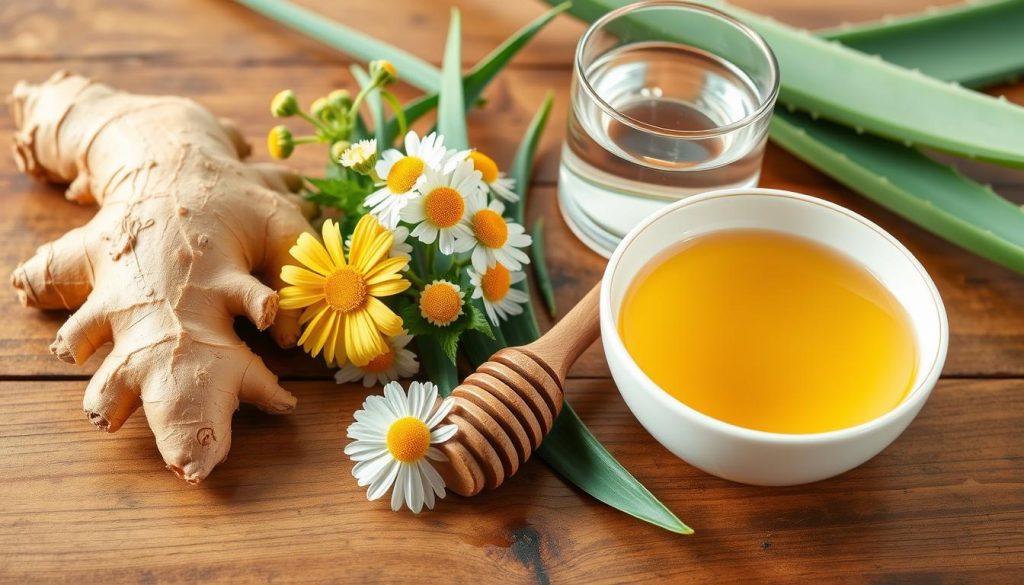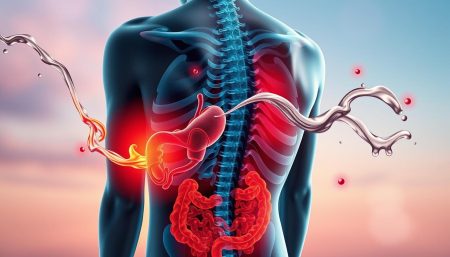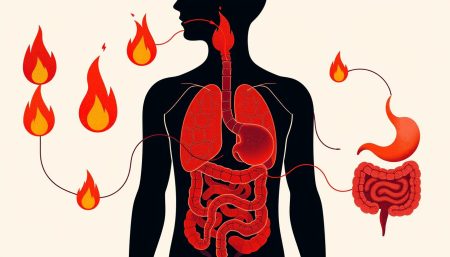In many kitchens and dining rooms, people face the pain of acid reflux. This common problem can ruin a day’s happiness with its burning feeling. It’s not just a small issue; it’s a sign that something needs to change for better health.
More and more people are looking for acid reflux natural remedies. They want to find relief that doesn’t come from medicine. Instead, they’re searching for answers in their own homes and habits.
Looking for what helps acid reflux means going beyond medicine. It’s about making lifestyle changes and trying natural ways to feel better. This article aims to help those suffering. It shows that true heartburn relief can come from nature and our daily actions.
Key Takeaways
- Understanding the holistic nature of acid reflux natural remedies as an effective approach to treatment.
- The value of lifestyle changes in achieving long-term heartburn relief.
- Insights into dietary adjustments that serve as preventative measures for acid reflux.
- Recognition of stress reduction and its role in alleviating gastrointestinal discomfort.
- An emphasis on the empowerment and reassurance for those battling frequent heartburn episodes.
Understanding Acid Reflux and Its Symptoms
Acid reflux, also known as gastroesophageal reflux disease (GERD), is a long-term condition. It happens when stomach acid or bile flows back into the esophagus. This can cause irritation and discomfort, and may lead to serious health problems. Knowing the symptoms of acid reflux is key to treating GERD effectively.
Many people ask what helps acid reflux. The first step is to recognize the symptoms. Here are some common signs of GERD:
- Heartburn – A burning feeling in the chest, often after eating and worse at night.
- Regurgitation – Acid backing up into your throat or mouth, tasting sour or bitter.
- Dysphagia – Feeling like food is stuck in your throat.
These symptoms can really impact your life, causing discomfort during meals and sleep problems. Recognizing them is the first step to better treatment and a better life.
Understanding and managing what helps acid reflux can improve symptoms and overall health.
| Symptom | Description | Common Triggers |
|---|---|---|
| Heartburn | Burning sensation in the chest | Spicy foods, chocolate, citrus fruits |
| Regurgitation | Acid backing up into throat | Fatty foods, caffeine, alcohol |
| Dysphagia | Sensation of food stuck in the throat | Overeating, certain medications, dry foods |
Managing acid reflux symptoms often means making lifestyle changes. These changes help reduce stomach acid and prevent acid backup. Knowing what helps acid reflux and the symptoms of acid reflux helps find the best treatment for you.
Identifying Triggers: Causes of Acid Reflux
Knowing what causes acid reflux is key to managing it. It’s about watching what you eat and how you handle stress. Both can affect how often and how bad acid reflux gets.
The Impact of Food Choices on Acid Reflux
Some foods can make acid reflux worse, showing why an acid reflux diet is important. Spicy, fatty, or acidic foods can cause discomfort. Here’s how different foods can affect your stomach:
| Food Type | Common Effect | Recommendation |
|---|---|---|
| Spicy Foods | Increases stomach acidity | Limit or avoid |
| Fatty Foods | Slows digestion | Choose leaner alternatives |
| Citrus Fruits | Increases acidic content in stomach | Consume in moderation |
| Chocolate | May relax lower esophageal sphincter | Eat in small amounts |
| Caffeinated Beverages | Can cause stomach to produce more acid | Limited intake |
The Connection Between Stress and Digestive Health
Stress affects more than just your mind—it impacts your body, especially your digestion. High stress can make acid reflux symptoms worse. So, managing stress is vital for lifestyle changes for acid reflux.
Yoga, meditation, and deep breathing can help with stress. They might also reduce acid reflux episodes.
Choosing the right foods and managing stress can help with acid reflux. Knowing what helps acid reflux lets you take steps to feel better every day.
What Helps Acid Reflux: Natural Relief Strategies
Looking for acid reflux natural remedies? Simple lifestyle changes can help a lot. Changing how you eat and sleep can make a big difference. These changes are natural and can really help manage symptoms.

Eating smaller meals more often can ease your stomach’s workload. Also, staying upright for at least three hours after eating helps keep stomach acid down. This is a natural way to treat GERD.
- Eat smaller, frequent meals to avoid overloading the stomach.
- Avoiding foods and drinks that trigger reflux, such as fatty foods, caffeine, and alcohol.
- Staying upright after meals to help prevent acid from rising.
Another good idea is to elevate your head while sleeping. This uses gravity to keep stomach acid in place. It’s great for avoiding heartburn at night. You can use a wedge pillow or raise your bed’s head.
Learn about the importanceof identifying trigger foods and adopting a balanced diet for effectiveGERD treatment.
| Lifestyle Change | Benefits |
|---|---|
| Eating smaller, more frequent meals | Reduces stomach pressure and prevents stomach acid from rising. |
| Staying upright after meals | Utilizes gravity to avoid acid flowing back into the esophagus. |
| Elevating head while sleeping | Helps maintain acid in the stomach at night, reducing nighttime reflux. |
Using these acid reflux natural remedies can make your life much better. While these changes are very helpful, don’t forget to talk to a doctor if your acid reflux doesn’t go away. They can help prevent serious health problems.
Optimizing Your Diet for Heartburn Relief
Starting an acid reflux diet is key for those looking to ease heartburn. This diet focuses on choosing food and drink for heartburn relief that’s good for you. It also avoids foods that can make symptoms worse. We’ll look at how changing your diet can help and share tips on what foods are best for acid reflux.
To understand what helps acid reflux, it’s important to know how food affects it. Eating foods high in fiber, lean proteins, and veggies is good. But, it’s best to stay away from caffeine, alcohol, and fizzy drinks.
Here’s a guide on how to plan your meals to manage acid reflux symptoms:
- Eat foods high in fiber like oats, legumes, and whole grains to aid digestion and ease pressure on the lower esophageal sphincter.
- Choose lean proteins like chicken, turkey, fish, and plant-based options to lower stomach acid.
- Add alkaline veggies like broccoli, cucumbers, and green beans to help balance stomach acid.
- Reduce foods that can trigger acid reflux, such as tomatoes, onions, and fatty meals.
| Food Group | Recommended Foods | Foods to Avoid |
|---|---|---|
| Fiber | Oats, beans, whole grains | Refined grains, low-fiber cereals |
| Proteins | Turkey, fish, tofu | Fried meats, high-fat dairy products |
| Vegetables | Green beans, celery, cauliflower | Garlic, onions, tomatoes |
By picking the right food and drink for heartburn relief and changing how you eat, you can cut down on acid reflux. These diet changes are a big help, but they’re part of a bigger plan to manage acid reflux.
Herbal Solutions: Teas and Supplements for GERD
Looking for natural ways to fight gastroesophageal reflux disease (GERD)? Herbal remedies for acid reflux and teas for heartburn might help. Here are some herbs known for their soothing effects and their potential to ease acid reflux symptoms.
- Ginger Tea: It has anti-inflammatory properties. Ginger tea can ease acid reflux by reducing inflammation in the esophagus.
- Chamomile Tea: It’s calming. Chamomile tea may help reduce acid reflux by soothing the digestive tract and improving sleep.
- Licorice Root: It can protect the esophagus from stomach acid. Licorice root enhances the mucous coating of the esophageal lining.
There are also supplements like slippery elm or marshmallow root for what helps acid reflux. These herbs are thought to create a barrier against stomach acids.
| Herb | Benefits | Potential Side Effects |
|---|---|---|
| Slippery Elm | Forms a soothing layer on the esophagus lining | May cause allergic reactions in sensitive individuals |
| Marshmallow Root | Coats the digestive tract; soothes irritation | Can slow absorption of other medications |
While herbal remedies for acid reflux and teas for heartburn have many benefits, it’s important to talk to a healthcare provider first. This ensures they’re safe for you, especially if you’re already taking other medications. It’s a smart way to use herbal solutions that meet your health needs and improve your quality of life.
Making Lifestyle Adjustments to Soothe GERD Symptoms
Lifestyle changes for acid reflux can greatly improve your life. Simple habits and changes can help, from weight management to daily routine changes.

Weight loss is very effective in reducing stomach pressure. This stops stomach acids from flowing back into the esophagus, a common problem in GERD. Even a little weight loss can make a big difference.
- Avoid tight waistbands, as they can make acid reflux worse.
- Eat at least three hours before bedtime to help digestion.
- Try gentle exercises like walking or yoga to aid digestion and reduce stress.
Quitting smoking is another key lifestyle change for acid reflux. It helps the lower esophageal sphincter work better and speeds up digestion.
| Lifestyle Change | Benefits |
|---|---|
| Weight Management | Reduces abdominal pressure, decreases acid reflux incidence |
| Reducing Tight Clothing | Less pressure on stomach, lower risk of acid escaping |
| Avoiding Late Meals | Allows time for digestion, reduces nighttime symptoms |
| Regular Gentle Exercise | Enhances digestion, controls weight, and reduces stress |
| Quitting Smoking | Enhances muscle function around the esophagus, speeds digestion |
Adding these habits to your daily life can help manage acid reflux. It also leads to a healthier lifestyle over time. Each change shows that taking care of your health is crucial in controlling GERD symptoms.
Non-Pharmacological Approaches to Combat Acid Reflux
Looking into non-medicinal heartburn relief is key for those wanting natural solutions. Acid reflux natural remedies include relaxation techniques. These help manage stress effects on the stomach.
Mindfulness and gentle yoga are great choices. They can lessen acid reflux by improving body and mind connection.
- Deep breathing exercises help regulate the nervous system and can reduce acid production.
- Gentle yoga poses like the ‘Bridge’ or ‘Cat-Cow’ may alleviate abdominal pressure and improve digestion.
- Meditation sessions foster a state of calm, beneficial for those experiencing stress-related acid reflux.
What helps acid reflux differs for everyone. Trying different things is important. Acupuncture is also effective in balancing the body and easing GERD symptoms.
Everyone reacts differently to treatments. So, it’s crucial to be patient and open when trying acid reflux natural remedies. Working with a healthcare professional can help choose the right natural remedies for you.
Going for non-medicinal heartburn relief means looking at the whole picture. It’s not just about the body. It’s also about emotional health, which can be affected by chronic conditions like GERD.
The Role of Probiotics in Managing Acid Reflux
Looking into the gut-health connection is key for acid reflux sufferers. Studies show that probiotics can be a good addition to treatment plans. This fits into the bigger picture of managing acid reflux.
Understanding the Gut-Health Connection
Digestive health is closely tied to the gut’s function. For those with acid reflux, the balance of gut bacteria is crucial. Probiotics add good bacteria to the gut. They might help lessen reflux by improving digestion and balancing gut bacteria.
Selecting Probiotics for Optimal Digestive Balance
Choosing the right probiotics for GERD means knowing about specific strains and product quality. Different probiotics work differently for digestive health. Lactobacillus and Bifidobacterium are often studied and show promise in managing acid reflux.
| Probiotic Strain | Benefits | Recommended for GERD |
|---|---|---|
| Lactobacillus acidophilus | Improves gut barrier, reduces acid reflux symptoms | Yes |
| Bifidobacterium bifidum | Restores healthy gut flora, aids in digestion | Yes |
| Saccharomyces boulardii | Antimicrobial and anti-inflammatory properties | No |
This table shows which probiotics might help with GERD. It also fits into a bigger plan for managing acid reflux. Remember, probiotics are just part of the solution. A full plan includes diet changes and lifestyle adjustments for best results.
Medical Interventions: When to Consider Acid Reflux Medications
Knowing when to seek medical help for acid reflux is key. Natural remedies and lifestyle changes work for many. But, sometimes acid reflux medications are needed to control symptoms and avoid serious issues. It’s important to know when to see a doctor for medical help.
Exploring Over-the-Counter Antacids and H2 Blockers
For quick relief from heartburn and acid reflux, over-the-counter antacids are often used. They neutralize stomach acid, offering fast relief. H2 blockers, like ranitidine and famotidine, cut down acid production in the stomach.
Understanding Prescription Options: Proton Pump Inhibitors and More
For severe symptoms, proton pump inhibitors (PPIs) are prescribed. PPIs greatly reduce stomach acid, offering longer relief than H2 blockers and antacids. Common PPIs include omeprazole and esomeprazole. Because of their strength and side effects, they should be used with a doctor’s guidance.
In the table below, you will find a comparison of different types of acid reflux medications focusing on their uses, effectiveness, and typical duration before relief:
| Medication Type | Primary Use | Effectiveness | Time to Relief |
|---|---|---|---|
| Antacids | Mild occasional heartburn | Immediate relief | 5-30 minutes |
| H2 Blockers | Moderate recurrent symptoms | Reduces acid production | 30-45 minutes |
| Proton Pump Inhibitors | Severe and persistent heartburn | Long-term acid suppression | 2-3 hours |

As we’ve seen, what helps acid reflux varies from diet changes to medicines. It’s vital to talk to your doctor about your symptoms and how often they happen. This way, you can find the best treatment for you.
Alternative Therapies: Complementary Practices for GERD Relief
Looking into alternative therapies for acid reflux can help manage GERD symptoms. These methods come from complementary medicine. They offer a holistic approach to health, improving both physical and mental well-being.
If traditional medicine doesn’t fully help with GERD, people often try alternative therapies. These aim to balance the body and work well with standard treatments. It’s important to choose therapies backed by evidence and effective as supplements to usual care.
- Chiropractic adjustments help correct body misalignments, easing pressure that worsens acid reflux.
- Acupuncture uses fine needles in specific points to reduce GERD symptoms by improving digestion.
- Hypnotherapy changes how patients see pain and discomfort from acid reflux, offering a mental approach to managing symptoms.
These therapies give patients a sense of control over their health. Knowing what helps acid reflux through both traditional and non-conventional means can greatly improve life quality.
| Therapy | Description | Benefits |
|---|---|---|
| Chiropractic Care | Adjustments to improve body alignment | Reduces abdominal pressure |
| Acupuncture | Needles at key points to improve energy flow | Enhances digestive health; reduces symptoms |
| Hypnotherapy | Behavioral technique to manage perception of discomfort | Alters response to symptoms; decreases discomfort |
Thinking about these alternative therapies for acid reflux is crucial. For those looking beyond medicines, these options might offer real relief and better control over their condition.
Addressing Stress as a Factor in Acid Reflux
Health experts know that stress and acid reflux are closely linked. Stress not only triggers but also worsens acid reflux symptoms. By managing stress, you can see big improvements in both your mental health and digestion. This might even cut down on acid reflux episodes.
To tackle stress and acid reflux, making lifestyle changes for acid reflux is key. A mix of stress-reduction methods can help ease GERD symptoms. It also boosts your overall health and happiness.
- Deep breathing exercises
- Meditation techniques
- Regular physical activity
- Structured sleep routines
- Counseling or therapy sessions
Using these stress management strategies can help reduce acid reflux. Along with lifestyle changes for acid reflux, they create a better gut environment.
| Technique | Description | Benefits |
|---|---|---|
| Deep Breathing | Engaging in slow, deep diaphragmatic breaths | Reduces stress, lowers heart rate, improves oxygen exchange |
| Meditation | Practicing mindfulness or guided imagery | Enhances mental clarity, reduces anxiety and stress |
| Regular Exercise | Activities like walking, yoga or swimming | Improves physical and mental health, stabilizes mood |
Understanding the link between stress and acid reflux starts with seeing how our mental and physical health are connected. By actively managing stress, you can greatly lessen the annoying and painful acid reflux symptoms.
Conclusion
Finding relief from acid reflux needs a mix of strategies. Knowing what helps acid reflux is key for lasting relief. We’ve looked at many acid reflux remedies, from natural fixes to changing how we eat and live.
These methods, used wisely, can lessen heartburn and boost digestion. Everyone is different, so a plan that fits you best is more helpful than a generic one. By mixing smart food choices, herbal aids, and ways to reduce stress, you can tackle GERD effectively.
This approach offers a better shot at controlling acid reflux symptoms. On your path to feeling better, know you’re not alone. Take charge of your health by looking for both quick fixes and long-term solutions for acid reflux.
If your symptoms don’t get better or get worse, getting medical help is a smart move. With the right info and support, you can manage acid reflux and succeed in your health journey.
FAQ
Q: What natural remedies can help with acid reflux?
A: To help with acid reflux, try changing your diet and lifestyle. Drink herbal teas like ginger and chamomile. Also, eat smaller meals and avoid foods that trigger your symptoms.
Q: How does diet impact acid reflux?
A: Some foods can make acid reflux worse. Avoid spicy, fatty, and acidic foods, as well as caffeine and alcohol. Eating more fiber, lean proteins, and veggies can help.
Q: Can lifestyle changes soothe GERD symptoms?
A: Yes, making lifestyle changes can help. Lose weight, quit smoking, and wear loose clothes. Avoid eating before bed and manage stress through exercise and mindfulness.
Q: Are herbal solutions effective for managing GERD?
A: Herbal teas like ginger, chamomile, or licorice root might help. Supplements like slippery elm or marshmallow root could also be useful. Always talk to a doctor before trying new supplements.
Q: What are probiotics’ role in managing acid reflux?
A: Probiotics can improve your gut health, which may help with acid reflux. Choose high-quality probiotics and consider when to take them for best results.
Q: When should I consider medication for acid reflux?
A: If diet and lifestyle changes don’t work, see a doctor. They might suggest antacids, H2 blockers, or stronger medications like proton pump inhibitors.
Q: Can relaxation techniques reduce symptoms of acid reflux?
A: Yes, techniques like deep breathing, meditation, and yoga can help. They reduce stress, which can lessen acid reflux symptoms. Mindfulness is key to managing stress.
Q: Are non-pharmacological approaches effective in combating acid reflux?
A: Yes, non-medical methods like diet changes, lifestyle adjustments, and relaxation techniques can work well. Tailor these approaches to fit your needs.
Q: Can alternative therapies provide relief from GERD symptoms?
A: Some people find relief with alternative therapies like acupuncture or chiropractic care. Use these methods alongside conventional treatments and with professional guidance.
Q: How do I address stress as a factor in my acid reflux?
A: Stress can worsen acid reflux. Try controlled breathing, meditation, or counseling to manage stress. Regular exercise and enough sleep also help.


















